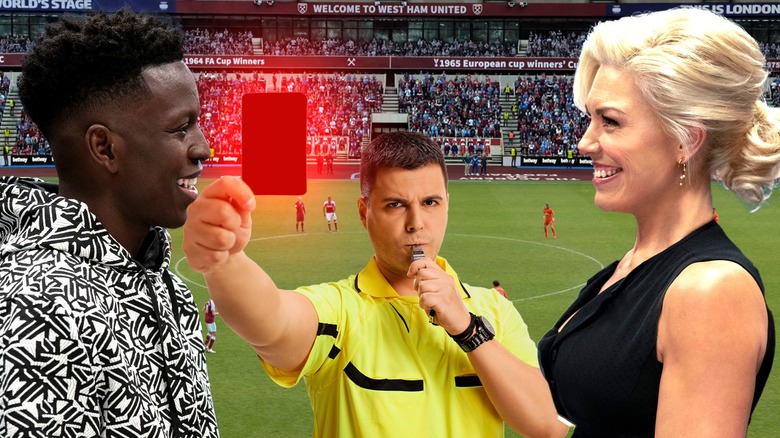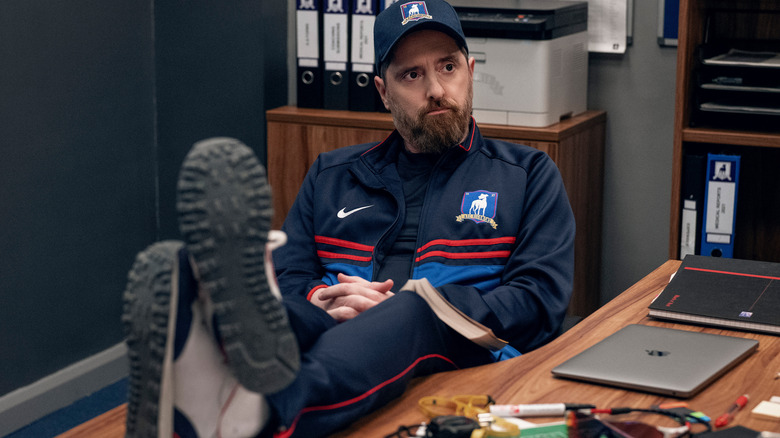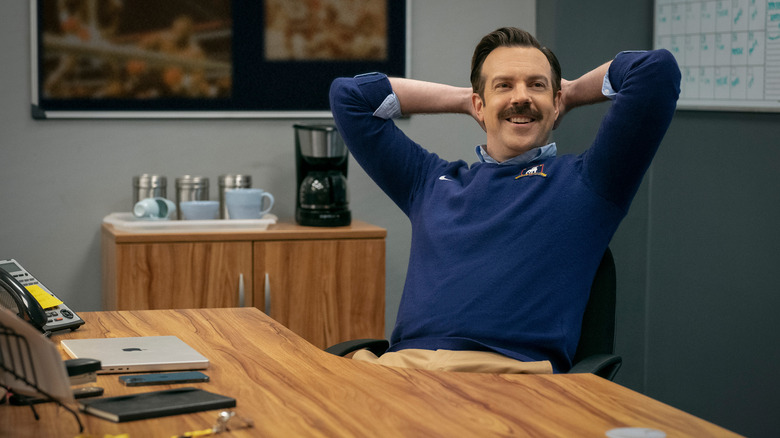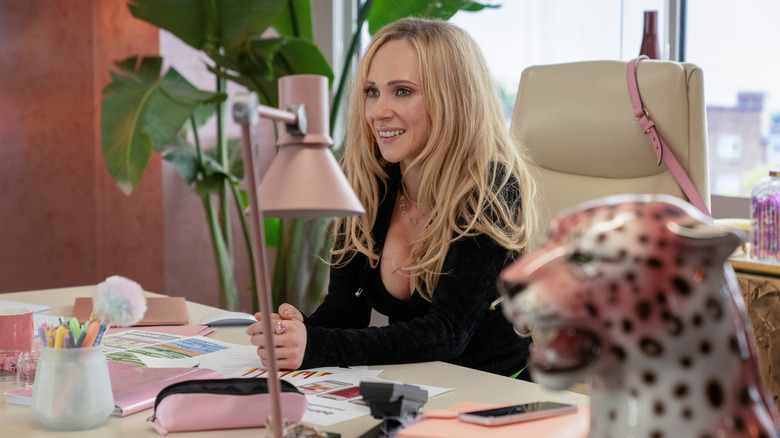Ted Lasso's Romantic Relationships Deserve A Penalty Card
Let's be honest: it's very difficult to come up with reasons not to like the AppleTV+ series "Ted Lasso."
Maybe we could say it's too heartwarming? Maybe it should give another comedy series a chance at the Emmys? Maybe Brett Goldstein's Roy Kent growl is too uncomfortably stirring? Right. "Ted Lasso" excels in pretty much every category, especially in its realistic portrayal of complex yet supportive friendships, and its mainstreaming of men's mental health. Yet it's the show's ability to create believable platonic relationships that makes its one flaw all the more confusing. "Ted Lasso" just can't figure out romantic relationships, and Season 3 continues to prove as much.
From the dreadful ghosts of an employee-boss romance that should have stayed very much dead to the borderline unethical conflict farm going on in America, not even the Kent growl can sell these cringey couplings. Most frustrating of all, though, is how these relationships work in service of predictable television tropes, rather than building fresh, relatable character arcs.
Ted Lasso uses toxic relationships for humor
The most obviously toxic of all the show's many unfortunate romances is that of Coach Beard (Brendan Hunt) and Jane (Phoebe Walsh). Since their fateful chess club encounter, the pair have been inseparably codependent, with Beard being on the receiving end of borderline abusive behavior. Their relationship is so troubling that Leslie Higgins (Jeremy Swift) wanted to intervene back in Season 2, but he was quickly dismissed by his fellow Diamond Dogs.
While it's perfectly believable that Ted (Jason Sudeikis) and Nathan (Nick Mohammed) would be worried about interjecting their opinions into someone else's relationship, the show cheapens whatever weight this storyline might've had every time it turns Jane and Beard's relationship into the butt of a joke. At this point, Ted limply acknowledging the weirdness of their romance for a quick laugh isn't enough to justify why the show hasn't developed it in a meaningful, informative way. While it may be unintentional, it feels at points as though the show really doesn't see their mutual romantic destruction as anything more than the crazy comedic hijinks of the stock eccentric character.
Ted Lasso's marriage counselor storyline went awry, too
At first, it made sense that Ted wouldn't trust his marriage counselor, or any therapist for that matter, when this trait of his was first introduced in Season 2. At the time, he was quietly stubborn and incredibly guarded: with that in mind, an entity whose sole purpose is to work around his walls to achieve meaningful change could only be his worst nightmare. Yet now, "Ted Lasso" has confused the point of its title character's hesitancy toward therapy.
Ted's fear has now been validated by the plot in the strangest way. As it turns out, Ted wasn't simply defensive of an outside force helping him to make changes in his life: he was picking up on very real signals that he and his wife unwittingly hired Doctor Steal Your Girl himself (played by Mike O'Gorman). This isn't to say that the Dr. Jacob reveal undoes Ted's growth from the previous season, but that it simply exists to create conflict in the most distracting way possible.
More than that, though, it sets up this relationship as something to be inherently forgiven. Michelle Lasso (Andrea Anders) could have been dating absolutely anybody for Ted to learn the lesson he needs to learn — that it's time to move on from his marriage. By involving something as obviously morally dubious as this, the conflict becomes less about Ted accepting change and more about him learning to be okay with this uniquely and justifiably upsetting dynamic.
Ted Lasso needs to be more realistic about workplace romances
Look, we'll level with you: if you strip away the patina of football, "Ted Lasso" is essentially a workplace comedy, and any workplace comedy worth its salt needs at least two or three "will-they-won't-they" office relationships to keep things interesting. To strip them of this component would be to rob them of a tried-and-true strategy that allows them to simultaneously meet audience expectations, create tension, and build character (this system is mathematically expressed by the "Jim-Pam-Dwight-Angela-Michael-Jan" matrix).
But while one could argue that "Ted Lasso" functions as a straightforward, grounded comedic fantasy, it traffics in too many feel good life lessons to avoid accountability by way of fiction. No, "Ted Lasso" is not real, but each episode presents at least one clear moral argument.
As the series attempts to inspire its audience to be better versions of themselves, forced office relationships just feel incongruous. Perhaps it's the fault of a viewer for hoping these characters would meet higher standards of "goodness," but it's hard not to cringe a bit when Rebecca (Hannah Waddingham) pursues her employee, Sam (Toheeb Jimoh), or when Keeley (Juno Temple) falls for her own investor. As exciting as it to go from zero LGBTQ+ relationships to two in the span of a few episodes, Keeley's failing to separate her business and personal lives is how she messed up with Shandy, right?
In real life, romantic relationships in the workplace can often breed conflict, awkwardness, and the potential for harm. If the series wants to present a realistic depiction of people working through difficult relationships, it needs to think further outside the box of TV tropes than it is right now.



